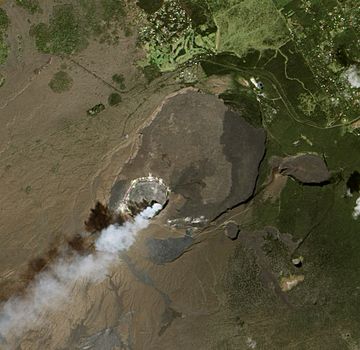Kīlauea Caldera facts for kids
Quick facts for kids Kīlauea Caldera |
|
|---|---|

Satellite image of the Kīlauea Caldera with a steam plume rising from Halemaʻumaʻu
|
|
| Highest point | |
| Elevation | 3,589 ft (1,094 m) |
| Geology | |
| Last eruption | 1982 |
The Kīlauea Caldera is a huge, bowl-shaped hollow found at the very top of Kīlauea, an active shield volcano in the Hawaiian Islands. Think of it like a giant, sunken crater! It's officially known as Kīlauea Crater. This massive bowl is about 2.93 mi (4.72 km) long and 1.95 mi (3.14 km) wide, covering an area of 4.14 sq mi (10.7 km2). Inside, you'll find Halemaʻumaʻu, which is another active, smaller crater.
Kīlauea Caldera: A Giant Volcano Bowl
A caldera is a large, bowl-shaped hollow that forms when the ground above a volcano's magma chamber collapses. This happens after a big eruption, or when magma moves away from under the volcano. The Kīlauea Caldera formed as the land sank downwards. Its walls are made of steep cliffs called fault scarps. These cliffs show where the ground has dropped.
Inside the Caldera
Most of the caldera's floor is covered by lava flows. These flows have erupted from the volcano since the 1800s. The Kīlauea Caldera and its nearby smaller crater, Kīlauea Iki, are surrounded by a road. This road is called Crater Rim Drive. It is about 11 mi (18 km) long. The road gives visitors access to Hawaiʻi Volcanoes National Park. The Hawaiian Volcano Observatory was built right on the edge of the Kīlauea Caldera in 1912. Scientists there study the volcano.
Eruptions Over Time
The Kīlauea Caldera has seen many eruptions. Besides the active Halemaʻumaʻu crater, the caldera itself has erupted several times. Some of the more recent eruptions happened in 1982, 1975, 1974, 1971, 1921, 1919, and 1918. There might have been even older eruptions in 1820 and 1790. These eruptions show that Kīlauea is a very active volcano.
 | Charles R. Drew |
 | Benjamin Banneker |
 | Jane C. Wright |
 | Roger Arliner Young |

